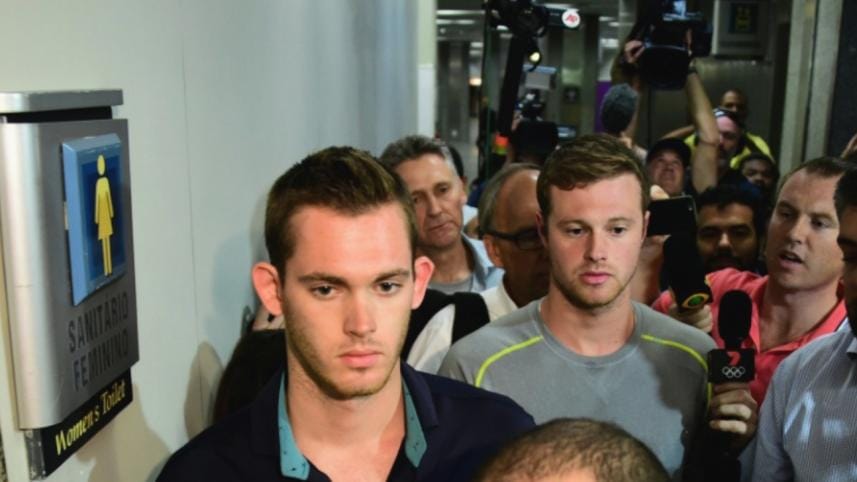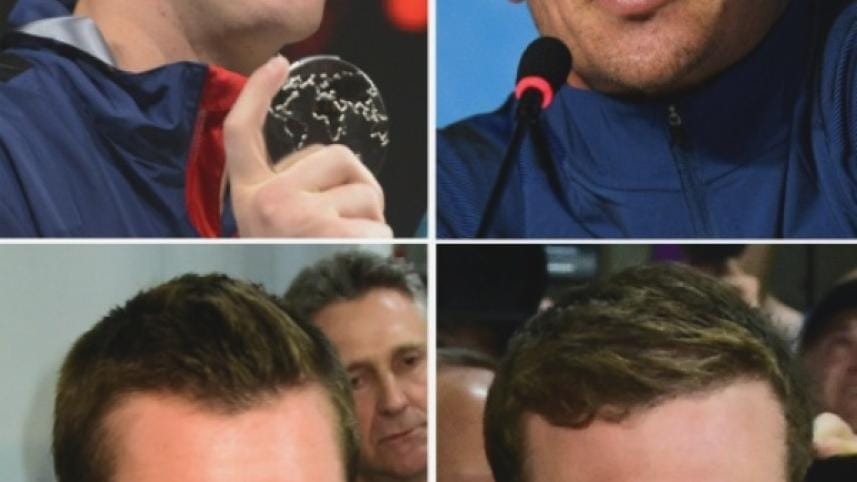Rio Olympics: US swimmers admit to inventing mugging

US Olympic authorities apologized to Brazil on Thursday as two US swimmers were allowed to go home having retracted a fabricated story about being mugged in Rio.
"We apologize to our hosts in Rio and the people of Brazil for this distracting ordeal in the midst of what should rightly be a celebration of excellence," US Olympic Committee CEO Scott Blackmun said in a statement.
Four US swimmers, including six gold medal hero Ryan Lochte, have been at the centre of a media storm in Brazil since claiming they were held up at gunpoint in a Rio gas station in the early hours of Sunday.
Blackmun spoke after Brazilian police let Gunnar Bentz and Jack Conger leave the country. "Their passports have been released and they recently departed Rio," he said.
A third swimmer, James Feigen, has also given police "a revised statement" about the fake mugging story "with the hope of securing the release of his passport as soon as possible," Blackmun said.
Lochte, was already back in the United States when the scandal erupted.
Lochte said on Sunday that the four had been victims of a robbery by at least one armed assailant posing as a Rio policeman.
The claim forced Brazil's Olympics organizers into an apology for the supposed security lapse.
Amid growing doubts, however, a Brazilian judge issued an order Wednesday that all four swimmers be kept in Brazil while the story was probed.
Brazilian police said Thursday the athletes were drunk and got into an altercation with security staff after vandalizing a gas station bathroom during a night on the town.
Blackmun indicated that the athletes, questioned by police Thursday, had confirmed the police version.
"They stopped at a gas station to use the restroom, where one of the athletes committed an act of vandalism," the US statement said.
"An argument ensued between the athletes and two armed gas station security staff, who displayed their weapons, ordered the athletes from their vehicle and demanded the athletes provide a monetary payment. Once the security officials received money from the athletes, the athletes were allowed to leave."
Lies and videotape
Rio de Janeiro's police chief Fernando Veloso called on the athletes to apologize.
He said CCTV footage at the gas station showed a security official pulling his weapon to restrain a drunk and angry Lochte and his teammates because they tried to leave after damaging the bathroom.
"There was no robbery of the kind reported by the athletes," Veloso told a press conference.
"The images do not show any kind of violence against them."
He said police believed the swimmers handed over the equivalent of about $50 in cash to pay for the damage before leaving.
Veloso said it was still not decided what charges, if any, would be brought against the swimmers.
"In theory, they could end up facing charges of falsely reporting a crime and damage to property," he said. Neither offense is punishable by prison.
"It would be noble and dignified of them to apologize. The only thing they told the truth about is that they were drunk."
Rio 2016 Olympics chief spokesman Mario Andrada, who had apologized to the athletes after the supposed robbery, was in forgiving mood Thursday.
"Let's give these kids a break," Andrada told a news conference. "These kids were trying to have fun... They made a mistake, it is part of life."
International scandal
Lochte, one of the most visible US faces at the Olympics, said an assailant put a gun to his forehead after the swimmers' taxi was pulled over.
"The guy pulled out his gun, he cocked it, put it to my forehead and he said, 'Get down,'" Lochte recounted.
"He took our money, he took my wallet -- he left my cell phone, he left my credentials."
His report caused the Olympic authorities huge embarrassment and overshadowed sporting action in the second week of South America's first Olympics.
It followed numerous confirmed incidents of theft from Olympic athletes and media covering the Games.
Brazil has deployed 85,000 police and soldiers to secure the Olympics.
The Lochte affair coincided with the arrest in Rio of International Olympic Committee member Patrick Hickey on allegations of taking part in a black market ticket ring.
Hickey fell ill during his arrest Wednesday. He left hospital on Thursday in a black car following a police car.
He was expected to face interrogation.




Comments